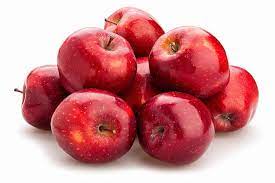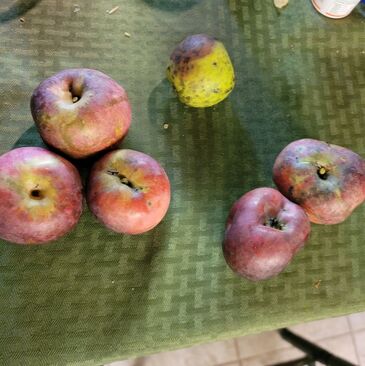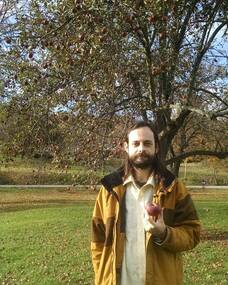 Arctic Fuji Apples Arctic Fuji Apples Modern Market Apples and Patents There are a few genetically modified and patented apples that have recently come onto the market. They are known as "Arctic" apples, and in addition to "Arctic Golden," "Arctic Granny", and "Arctic Fuji" which are now available for sale, other varieties are planned to be sold in the near future. Despite approval by the USDA which states these apples are safe to consume, we do not know the long term health effects or dangers of these or other GMO fruits and vegetables. These GMO's along with the conventionally hybridized but patented "Opal apple" are valued by marketers for their resistance to bruising and browning. Resistance to browning gives sellers more time to be able to profit from the fruits. These and many other popular supermarket varieties of apple have not been grown for their health benefits, nor for their good taste, but for qualities that improve marketability. The apples we see today are not the most flavorful, but have been selected instead for qualities like storing and traveling well, long shelf life, large well-formed, blemish-free fruits, quick growth, resistance to specific pests, and abundant harvests. Here is a link for an article providing more info about these modern varieties which are taking the market by storm. Only a small handful of the many thousands of varieties of apples in existence are widely available today on the US market, and the heirloom varieties are quickly disappearing. The value of biodiversity is being underestimated in favor of profit yields by the big producers. This creates a great potential for disease to destroy food crops. These patented varieties pose an even bigger threat because they cannot be grafted and grown at home by the public, but only by specific farms that who hold the patent or pay the patent holder for growing rights. This discourages growing at homes and small farms and it discourages the allowance of natural genetic variations which have led in the past to many valuable and disease-resistant varieties. Today, though there are many Opal apples sold in markets throughout the US, there is only one 6,000 acre farm in America that holds the legal right to grow these apples. It is extremely important now that we work to save the heirloom varieties before they are lost forever.  Historic Apples (left to right): "Wolf River," "Goldrush," and "Winesap" Historic Apples (left to right): "Wolf River," "Goldrush," and "Winesap" Historic Apple Varieties The historic apple varieties are not always the prettiest. They are often small, oddly-shaped, with blemishes, and russeting. But they have a wide range of flavors and uses which are lacking in the modern apple varieties. Many heirloom apples were prized in earlier times for specific uses; some for eating fresh, others for making pies and desserts, others for apple sauce, some for apple butter, and many for producing apple cider or cider vinegar. Some apples produced fruit very early in the season and others produced fruit late which could be stored throughout the winter to extend the harvest. They came in an array of colors ranging from almost white to nearly black; yellow, brown, red, orange, pink, and green. Their flavor ranged from cloyingly sweet to very tart, to bitter, astringent, spicy, fragrant, and pungent. A great example of a uniquely valuable apple would be the small unnamed variety we have been working to save from a friend's farmhouse in Bath County for the past few years. This apple has been prized for generations by the locals in the town of Hot Springs for its superlative qualities for making apple butter. The old tree is likely a chance seedling, and may be the only specimen in existence. The old tree is nearing the end of its life cycle and so we have been working to graft it to save its unique genetics for future generations. We encourage others to help save the old, rare apple varieties by growing their own fruit at home like previous generations. Many varieties are much more flavorful than modern supermarket apples, but they are virtually unknown today. The depth of flavor is unfathomable to those who have only tasted modern varieties. Many varieties taste more like apple candy than they do a "red delicious." Several important historic varieties in Virginia that are packed with flavor are "Winesap," "Esopus Spitzenburg," "Ashmede's Kernel," and "Gold Rush" (the parent of Golden Delicious). One flavorful apple stands out in central Virginia for its historic popularity. The "Newton Pippin," from New York grew and sold so well here, it is known in Virginia as the "Albemarle Pippin" for the county where it was grown.  Swamiji in Hot Springs with the Butter Apple we are working to save Swamiji in Hot Springs with the Butter Apple we are working to save In addition to our work to save several old apple varieties, we have been growing and promoting the heirloom varieties. We planted around 54 distinct historic varieties in the orchard at our last farm and we have brought many smaller saplings with us to the new farm. We have helped others to establish small home orchards of heirloom fruit trees. We are excited to have found at the new farm two older non-producing apple trees. With a little love, we should be able to get them producing next year. We are excited to see what rare gems we may have growing here. For the health of the people and the environment, we should promote the older, more natural varieties of food which were grown for their taste and health benefits rather than for their profitability. Preserving biodiversity helps nature to thrive. We should support local growers whenever possible. Small, ethical, local farmers have difficulty to compete with the factory operations using migrant labor and destroying the environment. Many small farms are disappearing today, because they simply cannot compete. When the longtime owner of a major local farm in Hanover County died recently, his children decided it was too little profit and too much work to maintain the farm and they sold the land. It is not always cheaper to seek out locally grown foods sources, but in the long run it does save us money. It is much cheaper than the medical bills incurred from eating unhealthy foods and it saves us the devastating expenses of natural disasters caused by the unsound and unethical practices of factory farming. We plan to compile a list of growers selling historic apples in the future, but for now more information about historic varieties and saplings for sale can be found at these two sources we know and trust: Century Farm Orchard Vintage Virginia Apples
1 Comment
|
Soma Matha BlogSharing news, articles, teachings, and events. Archives
September 2023
Categories |
 RSS Feed
RSS Feed